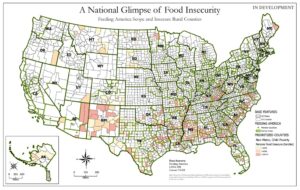The Food Bank of Central & Eastern North Carolina (FBCENC) is now better equipped to…
GISCorps volunteer Lauren Weaver assisted Warehouses4Good in their mission to improve the logistics of food distribution in rural counties. Warehouses4Good sought support to determine the locations where warehouse space would have the most positive impact on the philanthropic supply chain. In the scope of this project, Lauren integrated many datasets from the US Census, Feeding America, the USDA Food Atlas, Soil Surveys, and agricultural operations into a unified database. She then applied GIS tools (ArcGIS Pro and ArcGIS Online) to determine the most critical areas of focus for securing grants. From that data, national and regional maps were created.
The national maps prepared by Lauren identified locations where adding food warehouses would have the greatest impact on addressing food insecurity and access in rural counties and Indigenous communities. Regional patterns and local needs were clearly revealed, which led to a long-term strategy of developing 100 rural food warehouses by the end of 2028.
In support of grant applications, Lauren also produced more detailed regional maps, leading directly to pilot projects in the Mississippi Delta and Kentucky Appalachia. USDA planning grants have been secured for both projects and a third grant application is in review for an expanded Mississippi Delta scope. Additional regional maps are now being used to select our third pilot location.
More about Warehouses 4 Good:
Inadequate, unaffordable, or non-existent warehouse space in rural counties limits both inbound deliveries of donated food and outbound transport of locally-produced, revenue-generating products. Rural counties make up 63% of the US total, but account for 78% of all counties experiencing high food insecurity. Regional food banks serving these communities with food donations are often 100 miles or more away, increasing cost and decreasing frequency of rural food relief.
More daunting, warehouse space in these communities is either non-existent or not fit for this purpose. As a result, rural families have less access to fresh food, dairy, and high protein egg and meat products, compared to urban and suburban populations. Using advanced tools for site selection, planning, construction and operation, Warehouses4Good, a non-profit organization, aims to build or buy/renovate facilities which will host hunger relief and food hub non-profits in these under-served rural communities.
Project Complete.





